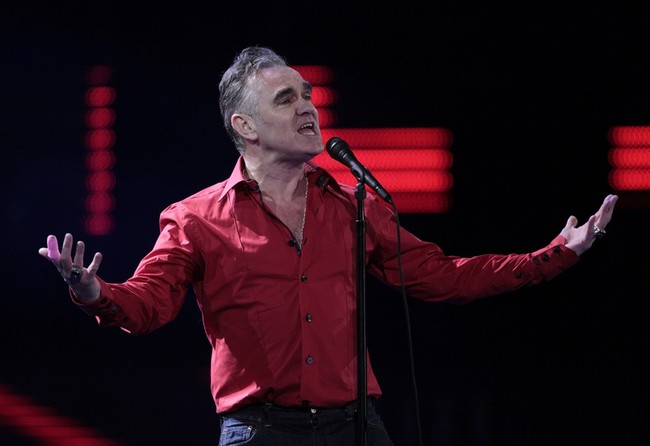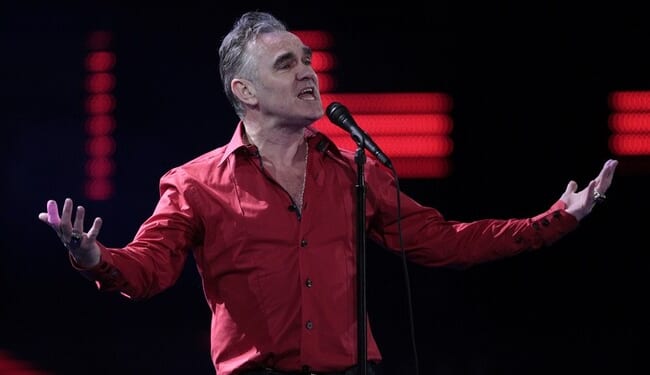
In the new film After the Hunt, there is an interesting scene that reveals how tyrants are intimidated by music. The setting is Yale University in 2019. Two academics, Alma Imhoff (Julia Roberts) and her friend Kim (Chloe Sevigny), are sitting in a bar when a song by the Smiths, “Heaven Knows I’m Miserable Now,” plays over the jukebox. The women express surprise. “Wait,” Kim says, “they’re playing that here?”
The surprise comes because Morrissey, the former singer for the Smiths and now a solo artist, is a controversial figure who has been canceled. The last place you’d expect to hear him is in a student bar in New Haven. Morrissey has questioned massive immigration, defended Kevin Spacey, and, as one scandalized writer in the far-left Guardian put it, “wrapping himself up in the Union Jack.” In England, wearing the country’s colors is now apparently a crime.
As I have been writing about in a series of articles for Hot Air, next year we are putting on an Anti-Communist Film Festival. I’ve decided to invite Morrissey because, although it is a different art form from film, music has played an essential role in unsettling, offending, and even dismantling the thinking of totalitarians. I also just think Morrissey is cool. I first saw him live in 1986 on The Queen is Dead tour. Even then, he was saying what he wanted.
In his great book The Rest Is Noise: Listening to the 20th Century, Alex Ross describes how totalitarians have always attempted to suppress music. “Lenin, the prototype of the twentieth-century dictator, had favorite authors and composers, but he was too rigorous a materialist to bother much with art,” Ross notes. “Music he regarded as a bourgeois placebo that covered up the sufferings of mankind. In a conversation with Maxim Gorky, he extolled the power of Beethoven, but added, ‘I can’t listen to music too often. It affects your nerves, makes you want to say stupid nice things, and stroke the heads of people who could create such beauty while living in this vile hell.’” Stalin censored art and was defied by composer Dmitri Shostakovitch.
In 1958, a Polish jazz musician named Tomasz Stanko heard the jazz pianist Dave Brubeck perform in Poland as part of a concert series that the U.S. State Department sponsored. The concert was intended to showcase the freedom inherent in jazz. Brubeck, in a 1958 interview in Down Beat, described the tour: “Whenever there was a dictatorship in Europe, jazz was outlawed. And whenever freedom returned to those countries, the playing of jazz inevitably accompanied it.” In Poland, the word freedom “was in the mouths of everybody we had anything to do with.” Stańko agreed. “The message was freedom,” he recalled in a New York Times interview in 2006. “For me, as a Polish who was living in Communist country, jazz was synonymous of Western culture, of freedom, of this different style of life.”
Pole rock has always had a tradition of rejecting communism.
Sadly, musical freedom is now frequently rejected by Americans themselves. In 2018, the music critic Chris Richards published a reprehensible piece. Published on the Fourth of July, Richards’ piece addresses “The 5 Hardest Questions in Pop Music.” The questions are: Is cultural appropriation ever okay? Should we listen to music against a dead artist’s wishes? Can today’s artists still sell out? How should we engage objectionable lyrics? Can we separate the art from the artist?
Richards makes the argument that musicians should censor themselves in deference to prevailing woke orthodoxies. He describes a band that loved a record by an R&B artist and wanted to cover it. They finally decided not to: “A band of white indie rockers performing the songs of a black R&B singer? No way. It would be seen as cultural appropriation.” Richards writes, “As badly as I wanted to hear their covers, they were right.”
Richards argues that cultural appropriation is wrong and should be avoided when it feels like “taking” instead of “making.” “When Justin Timberlake beatboxes, or Taylor Swift raps, or Miley Cyrus twerks to a trap beat,” he observes, “it feels like taking. Nothing is being invented other than superficial juxtaposition. On the flip side, when the Talking Heads echo African pop rhythms, or the Wu-Tang Clan channels the spirituality of Kung-Fu cinema, or Beyonce writes a country song, it feels more like making. The borrowed elements become an essential, integrated part of a new, previously unheard thing.” He adds: “We think we know this difference when we hear it, but sometimes we don’t—so there are more questions to ask, and many of them point toward an imbalance of power.”
In other words, music should submit itself to the social engineering of the social justice left. When I worked in a record store in the 1980s, the group Ciccone Youth, a side project of Sonic Youth, released The Whitey Album. It featured deconstructed covers of 1980s pop songs, including Madonna’s “Into the Groove.” The Whitey Album is a white art-punk band covering a dance artist from Michigan who’d moved to New York and appropriated gay club fashion and black dance music. We loved it, and Chris Richards wants it banned.
In After the Hunt, the film I earlier mentioned that features the music of Morrissey, music plays a central role. The character Frederik, a professor played by Michael Stuhlbarg, seems to float outside of the cancel culture ravaging Yale. While his Wife Alma, a professor played by Julia Roberts, is enmeshed in accusations flying about sexual assault and wrongthink, Frederik is seen conducting an imaginary symphony in the kitchen, cranking industrial dance music in the living room, and praising his favorite musicians. He is both above the fray and capable of easily dismantling the lies of a student who uses left-wing politics to get away with cheating. He is free.
So yes, we are inviting Morrissey to the Anti-Communist Film Festival. Because while the focus is one film, we also want to have guests and speakers who can also speak to the broader issue of leftist hostility to art. “Liberals are Killing Art, a 2014 essay by Jed Pearl in The New Republic, puts it well:
Do more and more liberals find the emotions unleashed by the arts—I mean all of the arts, from poetry to painting to dance—something of an embarrassment? Are the liberal-spirited people who support a rational public policy—a social safety net, consistency and efficiency in foreign affairs, steps to reverse global warming—reluctant to embrace art’s celebration of unfettered metaphor and mystery and magic? If you had asked me ten years ago, I would have said the answer was no. Now I am inclined to say the opposite. What is certain is that in our data- and metrics-obsessed era the imaginative ground without which art cannot exist is losing ground. Instead of art-as-art we have art as a comrade-in-arms to some more supposedly stable or substantial or readily comprehensible aspect of our world. Now art is always hyphenated. We have art-and-society, art-and-money, art-and-education, art-and-tourism, art-and-politics, art-and-fun. Art itself, with its ardor, its emotionalism, and its unabashed assertion of the imagination, has become an outlier, its tendency to celebrate a purposeful purposelessness found to be intimidating, if not downright frightening.
Editor’s note: We now have the room to run syndicated commentary by some of our favorite and most provocative thinkers on the Right. That only happens because of the support of our readers, who ensure that we have the resources to keep providing an independent platform and independent voices in a sea of Protection Racket Media domination.
Help us maintain that fight! Join Hot Air VIP and use promo code POTUS47 to get 74% off your VIP membership!








